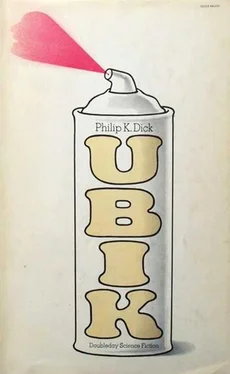“But Runciter will eventually be linked up to her,” Al said. “And he’ll tell her the truth. So you have to tell her the truth.”
They left the coffee shop and made their way to the chopper belonging to the Beloved Brethren Moratorium . “Maybe I’ll let Runciter tell her,” Joe said as they boarded. “Why not? It was his decision for us to go to Luna; let him tell her himself. And he’s used to talking to her.”
“Ready, gentlemen?” von Vogelsang inquired, seated at the controls of the chopper. “Shall we wind our doleful steps in the direction of Mr. Runciter’s final home?”
Joe groaned and stared out through the window of the chopper, fixing his attention on the buildings that made up the installations of Zurich Field.
“Yeah, take off,” Al said.
As the chopper left the ground the moratorium owner pressed a button on his control panel. Throughout the cabin of the chopper, from a dozen sources, the sound of Beethoven’s Missa Solemnis rolled forth sonorously, the many voices saying, “Agnus dei, qui tollis peccata mundi,” over and over again, accompanied by an electronically augmented symphony orchestra.
“Did you know that Toscanini used to sing along with the singers when he conducted an opera?” Joe said. “That in his recording of Traviata you can hear him during the aria ‘ Sempre Libera ’?”
“I didn’t know that,” Al said. He watched the sleek, sturdy conapts of Zurich move by below, a dignified and stately procession which Joe also found himself watching.
“Libera me, Domine,” Joe said.
“What’s that mean?”
Joe said, “It means, ‘God have mercy on me.’ Don’t you know that? Doesn’t everybody know that?”
“What made you think of it?” Al said.
“The music, the goddam music.” To von Vogelsang he said, “Turn the music off. Runciter can’t hear it. I’m the only one who can hear it, and I don’t feel like hearing it.” To Al he said, “You don’t want to hear it, do you?”
Al said, “Calm down, Joe.”
“We’re carrying our dead employer to a place called the Beloved Brethren Moratorium ,” Joe said, “and he says, ‘Calm down.’ You know, Runciter didn’t have to go with us to Luna; he could have dispatched us and stayed in New York. So now the most life-loving, full-living man I ever met has been—”
“Your dark-skinned companion’s advice is good,” the moratorium owner chimed in.
“What advice?” Joe said.
“To calm yourself.” Von Vogelsang opened the glove compartment of the chopper’s control panel; he handed Joe a merry multicolored box. “Chew one of these, Mr. Chip.”
“Tranquilizing gum,” Joe said, accepting the box; reflexively he opened it. “Peach-flavored tranquilizing gum.” To Al he said, “Do I have to take this?”
“You should,” Al said.
Joe said, “Runciter would never have taken a tranquilizer under circumstances of this sort. Glen Runciter never took a tranquilizer in his life. You know what I realize now, Al? He gave his life to save ours. In an indirect way.”
“Very indirect,” Al said. “Here we are,” he said; the chopper had begun to descend toward a target painted on a flat roof field below. “You think you can compose yourself?” he asked Joe.
“I can compose myself,” Joe said, “when I hear Runciter’s voice again. When I know some form of life, half-life, is still there.”
The moratorium owner said cheerily, “I wouldn’t worry on that score, Mr. Chip. We generally obtain an adequate protophasonic flow. At first. It is later, when the half-life period has expended itself, that the heartache arises. But, with sensible planning, that can be forestalled for many years.” He shut off the motor of the chopper, touched a stud which caused the cabin door to slide back. “Welcome to the Beloved Brethren Moratorium ,” he said; he ushered the two of them out onto the roof field. “My personal secretary, Miss Beason, will escort you to a consultation lounge; if you will wait there, being subliminally influenced into peace of soul by the colors and textures surrounding you, I will have Mr. Runciter brought in as soon as my technicians establish contact with him.”
“I want to be present at the whole process,” Joe said. “I want to see your technicians bring him back.”
To Al, the moratorium owner said, “Maybe, as his friend, you can make him understand.”
“We have to wait in the lounge, Joe,” Al said.
Joe looked at him fiercely. “Uncle Tom,” he said.
“All the moratoriums work this way,” Al said. “Come on with me to the lounge.”
“How long will it take?” Joe asked the moratorium owner.
“We’ll know one way or another within the first fifteen minutes. If we haven’t gotten a measurable signal by then—”
“You’re only going to try for fifteen minutes?” Joe said. To Al he said, “They’re only going to try for fifteen minutes to bring back a man greater than all of us put together.” He felt like crying. Aloud. “Come on,” he said to Al. “Let’s—”
“You come on,” Al repeated. “To the lounge.”
Joe followed him into the lounge.
“Cigarette?” Al said, seating himself on a synthetic buffalo-hide couch; he held his pack up to Joe.
“They’re stale,” Joe said. He didn’t need to take one, to touch one, to know that.
“Yeah, so they are.” Al put the pack away. “How did you know?” He waited. “You get discouraged easier than anyone I ever ran into. We’re lucky to be alive; it could be us, all of us, in that cold-pac there. And Runciter sitting out here in this lounge with these nutty colors.” He looked at his watch.
Joe said, “All the cigarettes in the world are stale.” He examined his own watch. “Ten after.” He pondered, having many disjointed and unconnected brooding thoughts; they swam through him like silvery fish. Fears, and mild dislikes, and apprehensions. And all the silvery fish recirculating to begin once more as fear. “If Runciter were alive,” he said, “sitting out here in this lounge, everything would be okay. I know it but I don’t know why.” He wondered what was, at this moment, going on between the moratorium’s technicians and the remains of Glen Runciter. “Do you remember dentists?” he asked Al.
“I don’t remember, but I know what they were.”
“People’s teeth used to decay.”
“I realize that,” Al said.
“My father told me what it used to feel like, waiting in a dentist’s office. Every time the nurse opened the door you thought, It’s happening. The thing I’ve been afraid of all my life. ”
“And that’s what you feel now?” Al asked.
“I feel, Christ , why doesn’t that halfwit sap who runs this place come in here and say he’s alive, Runciter’s alive. Or else he’s not. One way or another. Yes or no.”
“It’s almost always yes. Statistically, as Vogelsang said—”
“In this case it’ll be no.”
“You have no way of knowing that.” l
Joe said, “I wonder if Ray Hollis has an outlet here in Zurich.”
“Of course he has. But by the time you get a precog in here we’ll already know anyhow.”
“I’ll phone up a precog,” Joe said. “I’ll get one on the line right now.” He started to his feet, wondering where he could find a vidphone. “Give me a quarter.”
Al shook his head.
“In a manner of speaking,” Joe said, “you’re my employee; you have to do what I say or I’ll fire you. As soon as Runciter died I took over management of the firm. I’ve been in charge since the bomb went off; it was my decision to bring him here, and it’s my decision to rent the use of a precog for a couple of minutes. Let’s have the quarter.” He held out his hand.
Читать дальше








